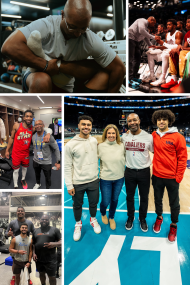A Dedication to Athletic Training: A Profile of Murphy Grant
From Personal Experience to Professional Excellence
Inspiration and Beginnings
Under the bright lights, Murphy Grant, LAT, ATC, PES, shone. In high school, Grant, an avid football player, lived on the gridiron. Those lights dimmed, however, when an unfortunate shoulder injury sidelined him. Fortunately, that injury opened doors and led him to Bonnie Rauls, MNS, LAT, ATC from HealthSouth in St. Louis, MO. His experience opened his eyes to the world of athletic training, a field he had not known before. Rauls took care of him and piqued his interest in the profession.
Later, as a collegiate student athlete, another injury as a freshman pulled Grant off the field and back into rehab. This time, he spent significant time with Brian Wood, ATC. Grant was not able to play in his sophomore year, but his determination and hard work led him back to football. Grant’s injuries on the field didn’t stop his athletic pursuits, but they did change the course of his career path. Grant’s experience with recovery and ATs prompted him to change his major from pre-med to athletic training. As Grant says, “I was able to keep both the sports in my life and the medicine. My mentor (Kathy Schneidwind, AT Ret) was also the head athletic trainer at Illinois State University, where I attended graduate school. She was the one who solidified all of this. She was the one who was instrumental in me passing my BOC exam. She has supported me and pushes me, even now, to continue to grow each and every day.”
Professional Journey
In a career filled with rewarding moments, Grant sums up his journey with gratitude to the athletes he treats and for being allowed to positively impact their lives. Grant states, “Being in a role to care for the athletes throughout my career, being able to affect their lives, hopefully, be a role model to them and provide a very high level of medical care to them has been rewarding.”
As an athletic trainer for 27 years, Murphy Grant has seen his share of injuries and has saved some lives, including one young student athlete who knocked on his door complaining of a sore throat. “I could tell that something was not right,” said Grant in an interview. “Upon evaluation and looking in his mouth and seeing his throat, I automatically referred him to the ENT and demanded that he get a biopsy.”
Doctors diagnosed the young man with cancer. “It was caught,” Grant said. “This young man underwent treatment and was able to return to the sport that brought him to college.”
But what if Murphy Grant had never become an athletic trainer in the first place?
The Role of NATA
The National Athletic Trainers’ Association (NATA) has been a cornerstone of Grant’s professional journey. As he relates, “NATA has supported each step of my professional growth by continuing to support athletic training and its members. The educational opportunities, including the national meeting that have been available for me, have been amazing. I took advantage of the many courses, classes, and webinars that I felt would benefit me and ran with it!”
Grant’s dedication and support of NATA goes beyond simply being a member. He has been very active within NATA, serving as the district representative and later chair for NATA's Ethnic Diversity Advisory Committee (EDAC), inaugural chair of the NATA Intercollegiate Council for Sports Medicine (ICSM) and the current co-chair of the AT Compensation Task Force. He believes the work he has been part of has changed the landscape of athletic training. Notable contributions include the return-to-campus documents during the COVID pandemic and resources on independent medical care and medical models of care.
Looking Ahead
For those considering a career in athletic training, Grant offers sage advice. “The profession of athletic training is fun, rewarding and an amazing field to get into. But, to get to that point it takes a lot of hard work and sacrifice. There can be a lot of failures, but the goal is to learn from the failures. Find other athletic trainers and surround yourself with those who are inspired, passionate, motivated, grateful and open-minded. Being successful is a choice that we all have to make every day.”
Grant’s view of the future of the profession is positive and inspiring. “I believe the profession of athletic training will continue to grow by providing more opportunities for athletic trainers. Our roles are so valuable to so many. We save lives! I believe in the leadership of the NATA. I also believe in the generation of athletic trainers that are up and coming. I believe in my son Jackson. He’s grown up in this profession and has seen it from a different lens. He’s gotten himself involved!”
Grant’s journey in athletic training is marked by personal experiences, professional growth, and a steadfast commitment to his field. He also acknowledges that his success and his career wouldn’t have been possible without the love and support of his wife, Amy Grant, ATC, and his whole family. His story is a testament to the impact and importance of athletic trainers in the lives of athletes and the broader patient community.

